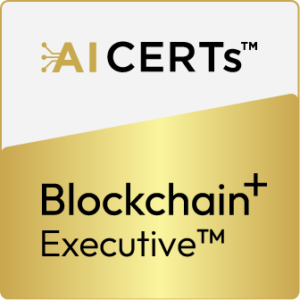- modules: 12
- Examination: 1
- Examination Time: 50 MCQs, 90 Minutes
- Passing Score: 70%
About Certification
Blockchain+ Executive™ certification program offers a comprehensive dive into the world of blockchain and cryptocurrency. Delve into the mechanics, smart contracts, and decentralized applications. Explore real-world applications, trading nuances, and regulatory landscapes. Grasp advanced concepts, future predictions, and synergies with other emerging technologies. Elevate your expertise in blockchain's evolving landscape with this holistic course.
Prerequisites
- Functional understanding of computing processes and open networks like internet
- Basic knowledge to follow pseudocode to understand a concept
- Ability to understand how various verticals work like finance, supply chains, asset trading etc.
- Fundamental understanding of how business utilizes information technology for process efficiencies and optimizations
Certification Modules
- 1.1 History of Blockchain
- 1.2 Types of Blockchains: Public, Private, Consortium
- 1.3 Components of a Blockchain: Blocks, Transactions, Hashing
- 1.4 Distributed Ledger Technology (DLT)
- 1.5 Consensus Mechanisms: Proof of Work, Proof of Stake, Practical Byzantine Fault Tolerance (PBFT)
- 1.6 Cryptographic Techniques: Hash Functions, Digital Signatures, Merkle Trees
- 2.1 Immutability and Tamper Resistance
- 2.2 Transparency and Auditability
- 2.3 Decentralization and Peer-to-Peer Networking
- 2.4 Tokenization and Digital Assets
- 2.5 Interoperability and Cross-Chain Communication
- 2.6 Scalability and Performance Challenges
- 3.1 Finance: Cryptocurrency, Payment Solutions, Stablecoins
- 3.2 Supply Chain Management: Track and Trace, Counterfeit Prevention
- 3.3 Healthcare: Electronic Health Records (EHRs), Medical Supply Chain
- 3.4 Identity Management: Self-Sovereign Identity, KYC Solutions
- 3.5 Gaming and Entertainment: Non-Fungible Tokens (NFTs), Decentralized Applications (DApps)
- 4.1 Decentralized Finance (DeFi) Platforms
- 4.2 Automated Market Makers (AMMs) and Decentralized Exchanges (DEXs)
- 4.3 Lending Protocols and Yield Farming
- 4.4 Asset Tokenization: Real Estate, Stocks, and Commodities
- 4.5 Central Bank Digital Currencies (CBDCs)
- 4.6 Regulatory Challenges and Compliance Considerations
- 5.1 Transparency and Traceability
- 5.2 Reduced Counterfeiting and Fraud
- 5.3 Efficient Inventory Management
- 5.4 Streamlined Documentation and Compliance
- 5.5 Improved Supply Chain Financing
- 5.6 Enhanced Supplier Relationships
- 5.7 Sustainability and Ethical Sourcing
- 5.8 Supply Chain Resilience and Risk Management
- 5.9 Collaborative Supply Chain Networks
- 5.10 Cost Reduction and Efficiency Gains
- 6.1 Data Security and Integrity
- 6.2 Interoperability and Data Sharing
- 6.3 Patient Empowerment and Control
- 6.4 Streamlined Administrative Processes
- 6.5 Clinical Trials and Research
- 6.6 Fraud Detection and Prevention
- 6.7 Regulatory Compliance
- 6.8 Telemedicine and Remote Patient Monitoring
- 6.9 Enhanced Patient Outcomes
- 7.1 Transparent and Trustworthy Governance
- 7.2 Secure and Efficient Identity Management
- 7.3 Improved Regulatory Compliance
- 7.4 Enhanced Voting Systems
- 7.5 Efficient Tax and Revenue Management
- 7.6 Digital Identity and Credentialing
- 7.7 Enhanced Supply Chain Management
- 7.8 Citizen Engagement and Participation
- 8.1 Regulatory Compliance
- 8.2 Smart Contracts and Legal Validity
- 8.3 Intellectual Property Rights
- 8.4 Data Privacy and Security
- 8.5 Cross-Border Transactions
- 8.6 Tokenization and Securities Regulations
- 8.7 Liability and Accountability
- 8.8 Regulatory Sandboxes and Innovation Hubs
- 8.9 Compliance Technology Solutions
- 8.10 Evolving Regulatory Landscape
- 9.1 Confidentiality Mechanisms
- 9.2 Permissioned vs. Permissionless Blockchains
- 9.3 Smart Contract Security
- 9.4 Immutable Nature of Data
- 9.5 Network Security
- 10.1 Cost Reduction and Efficiency Gains
- 10.2 Revenue Generation Opportunities
- 10.3 Market Disruption and Innovation
- 10.4 Global Trade and Commerce
- 10.5 Financial Inclusion
- 10.6 Capital Formation and Investment
- 10.7 Job Creation and Economic Growth
- 10.8 Risk Management and Resilience
- 10.9 Environmental Sustainability
- 11.1 Scalability Solutions
- 11.2 Decentralized Finance (DeFi)
- 11.3 Non-Fungible Tokens (NFTs)
- 11.4 Blockchain and Internet of Things (IoT)
- 11.5 Regulatory Developments
- 11.6 Environmental Sustainability
- 12.1 Enterprise Use Cases
- 12.2 Project Use Cases
- 12.3 Country/Government Use Cases
Certification outcome
Upon successful completion of the Blockchain+ Executive course, participants demonstrate a comprehensive understanding of blockchain technology, cryptocurrency mechanics, smart contracts, and DApps. They are proficient in various blockchain frameworks, knowledgeable about real-world applications, and well-versed in trading, regulations, and compliance. Additionally, participants grasp advanced blockchain concepts, forecast future developments, and understand the interplay of blockchain with other emerging technologies.











